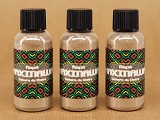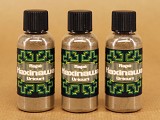Bottle, 10 Ml, 7 Gr from Brazil (SKU 4650)
(Batch #9936). Kaxinawá Cacau Força is a robust, grounding Rapé crafted by Huni Kuin artisan Leonel using ashes of wild Cacao bark and a blend of Moi and Corda Tabaco. This potent blend offers deep energetic cleansing while supporting physical endurance, mental clarity, and emotional balance. Unlike overly sharp Rapés, it delivers a warm, stabilizing force—ideal for spiritual work or daily grounding. Cacau ashes are revered for their calming and heart-centering effects, while the Tabaco blend offers both gentleness and strength. A reliable choice for those seeking clarity, stamina, and inner resilience. More information can be read below.
Packed in 10 ml clear plastic bottles containing 7 gr.
| change currency | |||||||||
| SKU | Part | Volume | Weight | Unit | Price | Qty
|
|||
|---|---|---|---|---|---|---|---|---|---|
| 4650 | bottle | 10 ml | 7 gr | 1 pc | $ 24.50 | ||||
| 4660 | bottle | 25 ml | 15 gr | 1 pc | $ 45.07 | ||||
| 4704 | pot | 60 ml | 40 gr | 1 pc | $ 122.49 | ||||
Kaxinawá Cacau Força - Grounding Power, Wild Cacao Spirit — A Stabilizing and Enduring Blend from the Huni Kuin Tradition
Function and Composition
This powerful Rapé blend from the Huni Kuin (Kaxinawá) tradition is crafted with wild Cacau ashes (Theobroma cacao), Arapiraca Corda Tabaco, and Moi Tabaco. Kaxinawá Cacau Força is a strong and grounding preparation, known for its ability to bring calm endurance, physical strength, and mental stability. It supports resilience in daily life while offering an energetic cleansing that remains smooth and centered. Compared to other Cacau-based Rapés, this blend has a higher ash content and stronger Tabaco presence, giving it a more earthy, grounded character with a less reddish tone and a more robust aroma.
Energetic and Ceremonial Effects
Upon application, users often describe a wave of searing warmth that gradually settles into a calming and steady vibration. The blend provides a state of clear awareness, rooted strength, and inner focus that lingers long after use. Unlike sharper or more purgative Rapés, this one offers a smooth yet penetrating experience. It is particularly suitable for daily grounding rituals, meditative preparation, or moments that call for mental and physical endurance.
Moi Tabaco
Moi is a mild yet deeply grounding variety of Nicotiana rustica, traditionally cultivated in Acre, Brazil. Known for its sweet, chocolatey aroma and balanced force, Moi Tabaco is used by the Huni Kuin to bring spiritual clarity and stabilize the senses. It is especially valued for ceremonial Rapé because of its ability to center the user without overstimulation. In this blend, Moi contributes to the soft, stabilizing undercurrent that harmonizes the Cacau ashes and the more potent Moi Tabaco. To read a detailed article on Moi Tabaco, click here.
Corda Tabaco (Arapiraca)
Corda Tabaco—fermented and twisted into thick, rope-like strands—is a powerful form of Arapiraca used throughout Brazil for its strength and depth. The fermentation process enhances both potency and smoothness. In this Rapé, it adds a grounding intensity that fortifies the blend’s overall structure and provides clarity and durability of focus. To read a detailed article on Arapiraca Corda Tabaco, click here.
Cacau Ashes (Theobroma cacao)
The ashes used in this blend are made from the bark and trunk of the wild Cacau tree, also known as Theobroma cacao. The Huni Kuin regard these ashes as a source of both physical vitality and spiritual stability. They are believed to cleanse and purify, supporting inner strength, endurance, and emotional equilibrium. Wild Cacau grows along the forest rivers, carrying the strength of the jungle in its dense, energetic wood. In Rapé, its ashes are smooth and aromatic, offering a grounding yet expansive experience. To read a detailed article on the Cacau ashes, click here.
Tribal and Cultural Context
The Kaxinawá, or Huni Kuin (“true people”), are one of the most prolific and well-known tribes in Acre, Brazil. Their Rapé tradition is rich and diverse, characterized by experimental blends and a wide spectrum of healing purposes. While some blends are reserved for deep spiritual work, others—like this Murici or Cacau preparation—are part of daily life, valued for their clarity, stability, and connection to forest energies. The Huni Kuin see Rapé as a pathway to healing, introspection, and spiritual clarity. To read a detailed article on the Huni Kuin tribe, click here.
About the Maker
This Rapé was prepared by Leonel, a respected Huni Kuin artisan known for his refined, high-frequency Rapé blends. Leonel blends tradition with energetic sensitivity, crafting preparations that honor both ceremonial lineage and subtle plant spirit. His versions often show balance, lightness, and precision, making them beloved by both tribal users and experienced practitioners worldwide. To read the full article about Leonel, click here.
Natural Variation and Care Notes
Because this Rapé is made from wild Cacau trees and handcrafted Tabaco, some variation in color and texture is natural between productions. The blend may appear slightly less reddish than other Cacau-based Rapés due to its higher ash content. Store in a dry, dark place in an airtight container to preserve its potency.
Breath Practice
To deepen the effects of this Rapé, pair with intentional breathwork. After application, remain seated, relax the shoulders, and inhale deeply through the mouth only. Hold the breath for a few seconds, then exhale by dropping the belly. Allow gravity to release the breath fully. Continue this cycle to circulate the energy and stabilize the experience.
On the Use of Intentions
Rapé works most effectively when used with clarity of intent. Before applying, take a moment to ground and connect with your purpose—whether for emotional cleansing, energetic focus, or spiritual openness. The spirit of the Cacau tree may aid in this centering. Read our article "The Power Of Affirmation".
Setting the Standard for Ultra Fine Rapé
We take great care to reprocess all received stock to ensure the finest quality powder. Often, Rapé arrives with varying levels of fineness due to the lack of professional sieves used by the tribe. To address this, we meticulously sieve all powders to remove rough bits and particles, resulting in an exceptionally smooth and effective powder at 150-micron fineness. We use laboratory-grade sieves and dehydrating equipment to achieve this quality. This is our standard because it provides the best Rapé experience.
Disclaimer
The information provided above is for historical, educational, and scientific purposes only. It should not be interpreted as a recommendation for the specific use of our products. Any statements about traditional uses are informational. The use and application of our products are the customer's decision and responsibility.
Copyright Notice
All content, including this article, is protected under copyright law. Any unauthorized reproduction, distribution, or use of this material is prohibited. Duplication of this content, in whole or in part, without written consent, is a violation of copyright regulations.
Other names: Huni Kuin Cacao, Cacao Bravo.
This item is not allowed in the following countries:
Finland
This natural product is offered for its ethnographic and historical value and is delivered with no expressed or implied fitness for a specific purpose. It is simply a raw botanical specimen, or a scientific sample. The information provided is purely meant for historical, scientific and educational purposes and should never be interpreted as a recommendation for a specific use. The use and application of our product is at the customer's decision, responsibility and risk.
Read our Terms & Conditions for more details.











